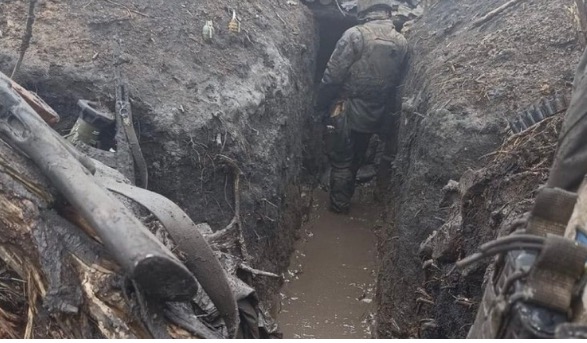
SAY WHAT? - This weekend, as Russia's brutal, pointless, little-heeded war against Ukraine lurched on, grim images emerged on social media of Ukrainian soldiers caught in the bloody quagmire around Bakhmut, an eastern city that after months of fighting has devolved into a ravaged landscape of splintered, shell-torn trees, yawning artillery craters, strewn dead bodies, and sodden Ukrainian forces hunched in a muddy, freezing, deadlocked trench warfare against relentless enemy barrages that in its desolation and destruction some have likened to "the new Passchendaele." That infamous 1917 clash, also known as the Third Battle of Ypres, saw the Allies suffer roughly 300,000 casualties and inflict almost that many on the Germans in one of the most costly battles of World War One; it is remembered not only for its horrific loss of life but its freezing, sucking mud, "a monster," that drew soldiers to their deaths.
In "a bloody vortex for two militaries," Russian leaders desperate for a victory have been focused on moving reinforcements to the killing fields of Bakhmut. After so many reverses for their elite units, fighting has reportedly fallen to a mix of separatist militias, mercenaries and newly mobilized, ill-trained conscripts backed by massive artillery barrages, often aided by drones to make them particularly, lethally accurate. Amidst reports of Russian assaultson a "World War One hellscape," observers cite Russia's stunning disregard for their own troops, with commanders sending "single use" soldiers out in waves "like meat" to find Ukrainian positions; with Russian losses estimated at up to 300 a day, Ukraine "has become one giant graveyard" for them. Others say Ukraine's wet, cold winter is "the biggest killer" for "under-trained, under-supplied, ambivalently led" recruits lacking proper food, gear, boots or shelter, with dozens freezing to death.
For many, Putin's bloody debacle in Ukraine reflects a system "in which medievalism meets Stalinism meets dark farce," the "barbarism to which Russia’s 'new normal' has sunk... part horror movie and part theater of the absurd" in which leaders rant about a "holy war" against Satan and even the few surviving protests have a touch of the surreal. But the remaining, mostly elderly residents of Bakhmut, who make up perhaps 10% of its pre-war population of 80,000, have more concrete concerns: Sheltering in wet basements, they face a winter without adequate power, water, heat, food. Intrepid volunteers have mobilized to deliver wood stoves, chop firewood, gather warm clothes and other necessities; harrowing videos show them evacuating, often under heavy shelling, the ill and infirm. Those who stay are pissed. "Why is Putin so stupid?" asks one woman. "Doesn't he have enough land?"
Over a century ago, H.G. Wells described the First World War as "the war that will end war," though over time the term has morphed into, "the war to end all wars." It was used first hopefully, then desperately, for a conflagration that began for no truly coherent reason in September 1914, lasted over four years, and ended with roughly 40 million casualties, about evenly divided between dead and wounded. Wells believed the conflict would create a new world order in which future conflicts would be impossible, and a world government would protect individual human rights regardless of sex, creed or color. By crushing the Kaiser's German empire, and the Austro-Hungarian and Ottoman empires, the Allies would serve as not just soldiers in war but "crusaders against war." “There shall be no more Kaisers," he wrote. "We are resolved. That foolery shall end! It is the last war.” Oh, what a falling off was there.
"War will only end when people so realize its horrors (that) they prefer to refrain from fighting even when they believe that they have a just cause.” - Bertrand Russell on the "more calm and equable courage" peace requires.
(Abby Zimet has written CD's Further column since 2008. A longtime, award-winning journalist, involved in women's, labor, anti-war, social justice and refugee rights issues. Email: [email protected])





